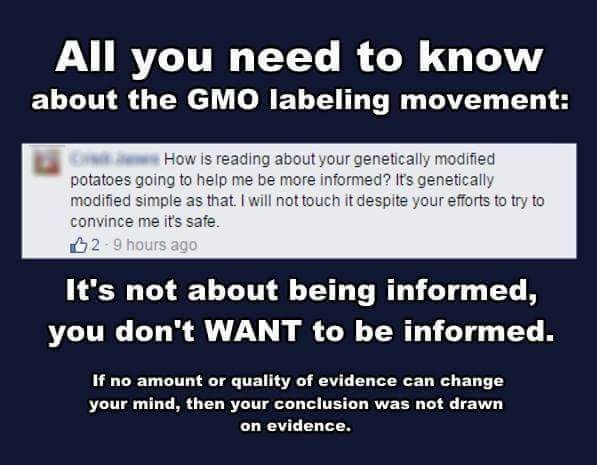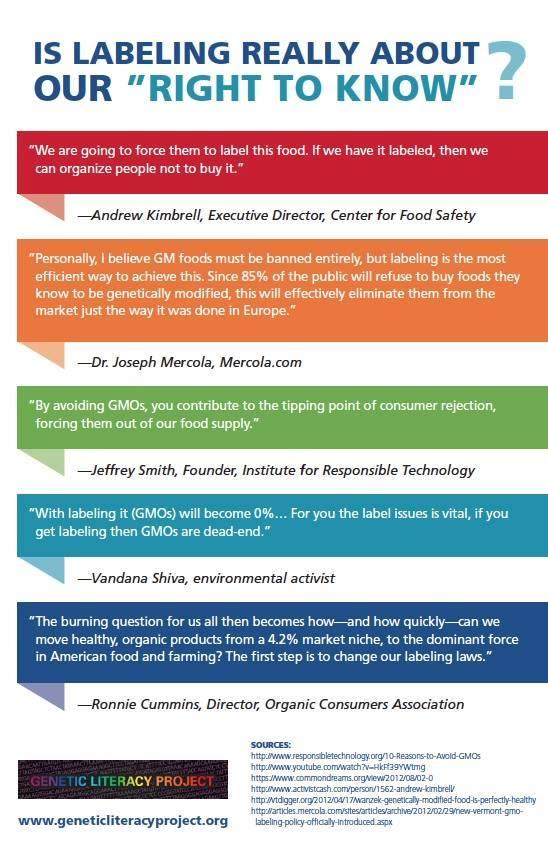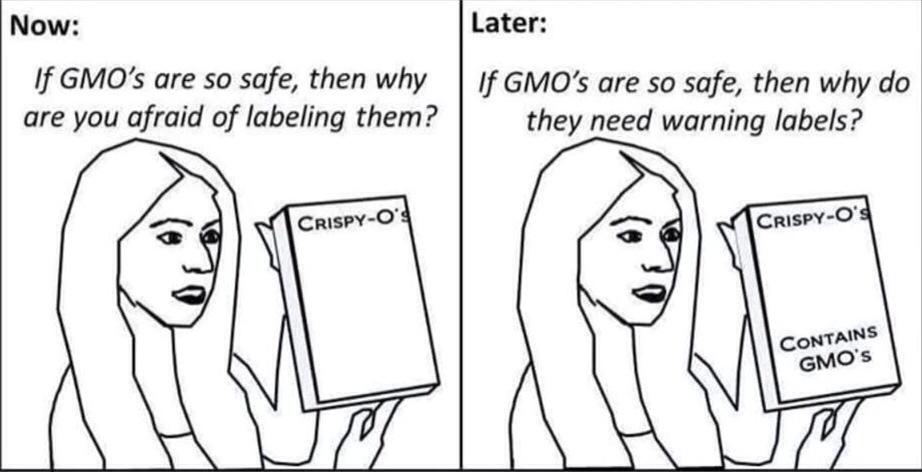The issue of whether or not there should be a mandatory label for all genetically engineered (GE) foods is a hotly debated issue in the public conversation on biotechnology and its implementation in modern agriculture. Proponents of such a law often ask questions such as “If GMOs are so safe, why won’t you label them?” And proclaim that they have “the right to know” what’s in their food. They claim that it’s just a matter of transparency and makes for informed consumers.
These lines of argument are misleading (for reasons I will elaborate upon momentarily), but on the surface they seem compelling to people who aren’t familiar with the debate-framing techniques they utilize; so much so, that one can come across numerous individuals on social media who seem convinced that the only way anyone could possibly have any reason to oppose mandatory GE food labeling would be if they had a personal financial stake in the matter. Thus, even the most reasonable counter-arguments are frequently met with the accusation of “Monsanto Shill!”
The Dishonesty and Intellectual Vacuity of the Shill Gambit Fallacy
As a skeptic blogger, public science communicator, and frequent critic of some of the mandatory GMO labeling law proposals currently under discussion, I witness this behavior on a regular basis. As much as I’d like to be able to say that the Great and Terrible MonSatan’s Shape-Shifting Shilluminati Reptilian Overlords provide me with DecaShillions of dollars per femtosecond for disagreeing with random anti-science activists on the internet, it is sadly not the case. It’s also an implicit appeal to motivation logical fallacy because it doesn’t actually rebut the arguments, so it wouldn’t be valid even if it were true. See here for more on why the Shill Gambit fallacy fails.
Okay, just one more silly meme and then I’ll be serious. I promise!
However, putting aside the logistical and financial implausibility of the notion that everybody who thinks mandatory labeling is a bad idea must be paid by corporations to disagree with random people in obscure corners of the internet, there are indeed several good reasons why a mandatory label specifically and exclusively for genetically engineered foods would be neither sensible nor desirable.
It Would be Misleading and Would Convey no Objectively Relevant Information
For instance, considering how thoroughly biotech opponents have flooded the internet with propaganda against GE foods, mandatory labels could easily be misinterpreted as a warning. It would mislead people into thinking it denoted some kind of pertinent difference in safety and/or nutrition between GE foods, conventional, and organic foods, when that is simply not the case. Mandatory labeling proponents like to respond to this with a slippery slope rebuttal in which they imply that this point is comparable to opposing ingredient labels, macro-nutrient breakdowns, or allergen warnings, but those are flawed comparisons. Genetic engineering is a process: not an ingredient, and unlike GE food labeling, labeling for ingredients, allergens and nutritional content, actually DOES convey information pertinent to nutrition and safety. From an objective scientific point of view, breeding method is irrelevant to health and safety. As a side note, GE food opponents sometimes use the possibility of new allergens as an argument against the technology, but I’ve already deconstructed that claim here.
There are a couple of ways in which labeling proponents may respond to this point (not counting the aforementioned shill gambit fallacy, which is more of an admittance of defeat than a counter-argument). One way is for the labeling advocate to assert that there IS in fact a relevant difference, and that GE foods are, in fact, ruining people’s health. However, that approach puts the labeling proponent in a disadvantageous position because they then have to argue against the international scientific consensus, which is bound to be an unpromising strategy: one which I’ve already addressed at great length here, so I’ll try to keep this section brief.
The Scientific Case: Why a “GMO” Label Conveys No Information Objectively Relevant to Health:
Suffice it to say that there is a formidable body of scientific data to corroborate the conclusion that GE foods are at least as safe as their non-GE counterparts, and there is an international scientific consensus based on it. The standards of safety testing are orders of magnitude more rigorous than is required for those other breeding methods, all of which affect hundreds or even thousands of times as many genes than GE methods do, and which do so in ways that are not tracked or accounted for as well as they are with new GE products (citations to many studies, reports and systematic reviews, as well as position statements from numerous credible scientific organizations are hyperlinked within).
At least about half of the GE food research is independently funded, contrary to the claims of most opponents of the science, so any claims that the scientific consensus is bought and paid for by corporations are simply not credible. Even the oil giants several of whom are 20-30 times larger than the biggest biotech companies are capable of buying off the entire global scientific consensus in a particular field.
I’ve also already addressed other common specious pro-labeling arguments such as: patents, “superweeds,” pesticide use (GE crops have actually helped reduce total pesticide use, and facilitate a segue to less toxic herbicides), accidental cross-contamination, the tobacco science gambit, allergens, seed saving, and terminator seed myths in the past. For that reason, I won’t be focusing on any of those (nor the safety arguments) here. It’s good policy to take on what is one of the best arguments available from any position with which one disagrees, and those ones are all relatively easily refuted, so there’s no point in me reiterating their flaws now.
I understand that there are some for whom no amount of evidence will ever change their minds, but it is not necessary to convince them to change their beliefs. It suffices to demonstrate their beliefs are unfounded, because they tend to eventually out themselves as irrational ideologues. This permits neutral bystanders who are still forming their views on the matter to discern which is the more rational point of view to adopt.
The unapologetic science deniers may not admit it when they’re shown to be wrong, but they’re usually the easiest to refute.
Removing the debate from the realm of scientific discussion
That’s why the more clever labeling proponents opt to tacitly concede the mainstream scientific position on GE foods, and instead make political arguments for mandatory labels that don’t rely on explicitly rejecting the science.
One way they do that is to give examples of other types of existing food labels that don’t have any scientifically-backed relevance to health. The purpose of that is to then argue that it’s okay to force labeling for things devoid of any real evidence-based relevance to the health and safety of the product because we already do that anyway. I’ve already addressed that line of argument here, particularly the example of Country of Origin Labeling laws (aka COOL laws).
Nevertheless, it’s still a more sophisticated strategy than the “GMOs are killing us” approach, because it means that the labeling proponent doesn’t have to fight the inevitably losing battle of disputing the science of GE foods. It instead allows him or her to reframe the discussion in purely normative terms. There’s more wiggle room when debating matters of politics and personal values than there is when overtly denying a formidable body of scientific knowledge.
That said, there are normative reasons to oppose mandatory GE food labeling as well.
The Costs of an Unnecessary Labeling Mandate
First and foremost, it would likely increase costs at nearly every stage in the supply chain. Labeling proponents often hold this naïve notion that mandatory GE food labeling would only entail the mere cost of the sticker and print job. Well, I’m telling you that if the cost argument sounds specious to you, then it’s because you don’t understand the issues at hand. The bulk of the costs wouldn’t come from the price of hiring a graphic designer or from merely slapping stickers on things. What about regulatory oversight? What good would such a label be without enforcement of regulatory standards? What about the storage and shipping segregation costs at each and every node in the supply chain from farm to supermarket?
This study on labeling by the Council for Agricultural Science and Technology (CAST) is one of the more comprehensive ones I’ve seen with regards to the cost of GMO food labeling.
Also, there’s this article from Nebraska Wheatie if you prefer to understand from a farm perspective. Getting grains from the fields to the plant is not as easy a feat as one might assume, and additional superfluous segregation makes it worse.
Such a mandate would also add an additional layer of unnecessary government bureaucracy. It’s not as simple as merely saying “just label it”. There will have to be heavy government oversight into what is considered a GMO, what percentage of a product might have to be GE in a particular product for the product to warrant a label, and there would have to be some sort of punishment worked out for improper labeling. It would be a waste of lawmakers’ time and attention, and would probably lead to a flood of lawsuits, tying up our courts as well.
Double Standards
Second, it would represent a hypocritical double standard in that it would arbitrarily stipulate that transgenics and cisgenics be labeled, while ignoring the use of mutation breeding techniques, which use ionizing radiation and mutagenic chemicals to force random mutations in the development of many crops, (including many certified organic crops, no less). This process, as well as hybridization and even selective breeding, all affect hundreds or even thousands of genes in ways that are entirely untracked. The end products of this process undergo no safety screening or allergy testing at all before being brought to market. Even wide-cross hybridization and traditional selective breeding involve greater modifications to the genome than the more precise modern molecular genetic engineering techniques, the products of which currently undergo multiple iterations of at least three tiers of testing over a period of several years before being granted acceptance. It typically takes more than a decade (give or take) to bring a new GE product from the preliminary Research and Development stage to the market, and costs well over $100 million USD, tens of millions of which are allocated to satisfying regulatory testing requirements and registration alone. They are perhaps the most tested category of foods in the entire history of food science, so anyone who tells you they aren’t tested long enough is either grievously misinformed, or is applying an irrational double standard for no good reason (this comic from SMBC comes to mind). Note: This is not to say that mutagenesis, hybridization or other methods of modifying genomes are bad, per se. The point is that the singling out of transgenic and cisgenic organisms is a patently absurd double standard.
This problem is largely due to the fact that “GMO” is a very poorly defined and misleadingly named term. It stands for “Genetically Modified Organism,” yet it’s used colloquially to refer almost exclusively to transgenic organisms, despite the fact that literally ALL of the food in our food supply has technically had its genome “modified” in some manner or another, which makes the term a bit of a misnomer. I frequently use “Genetically Engineered” instead of “Genetically Modified” in order to avoid ambiguity, but old habits die hard and the term is unlikely to go away anytime soon.
The Real End Game
Third, the push for labels comes largely from the organic food industry, a $63 billion+ a year industry worldwide, much larger than any of the big agricultural biotech companies, and one which has poured millions into negative and possibly even bordering on libelous anti-biotech propaganda campaigns designed to increase their market share. The whole labeling issue is nothing more than a clever marketing strategy to get people to continue to pay inflated prices for food that is no better for them (a conclusion you can cross corroborate here, here, here and here). Many in the upper echelons of the organic and anti-GMO industry have openly admitted that the ploy for GE food labeling is the first step towards their real end game, which is to dupe people into getting GE foods banned, which would eliminate their most viable competition. This is not speculation, nor has any great effort been put forth to conceal the goal. The quotes in the following graphic illustrate why it’s naïve to assume that GE food opponents won’t double down to try to get GE foods banned if and when they get the mandatory labels they desire.
Dr. Steven Novella explains it thusly:
They have successfully demonized GMOs and the companies who produce them, largely through misinformation, distortion, cherry picking, and outright lying. Now they want to capitalize on that groundwork by labeling GMOs.
If they win on that front, they will increase, if anything, their demonization of GMOs. They will push for banning, county by county, state by state, and also push for federal laws to make producing or using GMOs all but impossible.
That is partly what the labeling issue is about also. Make it such a burden that companies will choose to go GMO free for the practical and propaganda benefits (even in the absence of any scientific reason).
Framing the debate in this way allows mandatory labeling proponents to set up a useful catch-22. Before mandatory labeling laws, they get to ask loaded questions such as “If they’re so safe, why don’t you label them?” After the implementation of mandatory labeling laws, they get to ask “If they’re so safe, why did they need to be labeled?” The answer to the former question is because mandatory food labels are supposed to be for information pertinent to consumers making food choices conducive to health and nutrition. The answer to the latter question is that they DIDN’T need to be labeled. Anyone attempting to deconstruct the deceptive reasoning at play gets labeled a troll or a Monsanto Shill based on the false premise that nobody would ever take issue with it unless they were monetarily compensated for doing so.
Yet, hardly anyone seems to be even moderately skeptical of the organic industry, but many people will credulously swallow any poorly sourced propaganda garbage they hear that makes biotech companies look bad. That David and Goliath image the Organic Industry has constructed is simply part of their marketing strategy. Obviously not everyone who participates in (or advocates for) organic farming is guilty of this, but enough of them are complicit in permitting the public to believe convenient myths without challenging them. These myths include the notion that “organic” means no pesticides, and that organic is safer and/or more environmentally sustainable than conventional farming. There is no compelling scientific evidence for any of these common public perceptions, yet the popular acceptance of such myths gets used to portray biotech science as illegitimate, the scientists as untrustworthy, unethical, and obedient lackeys of “evil” corporations, and organic farmers and advocates as trustworthy altruists uninterested in such shallow pursuits as monetary compensation. It’s all about influencing public perception to weave a narrative that circumvents the need to scientifically demonstrate the superiority of their methods, and the push for mandatory GMO labels is no exception.
We Already Have Voluntary Labels Which Convey this Information
Fourth, mandatory GMO labels are unnecessary given that there are already voluntary labeling initiatives to cater to those who have anti-GMO ideologies. People can already make a decision to buy organic or non-GMO certified, both of which are labeled. Therefore it’s dishonest to pretend that mandatory GMO labels are a prerequisite to someone avoiding genetically engineered foods.
Government Mandates Should be Based On Reason: Not Ideology
I personally think such ideologies are silly and unfounded, but I’m fine with you having such leanings. It’s none of my business really. However, I’d really rather that YOU pay the costs of separate logistics, storage, shipping and inspection yourself rather than imposing them upon the rest of us (lest it become my business).
This is consistent with how we treat Halal, Kosher, and other manner of ideologically-based preferences that aren’t predicated on any kind of scientific evidence of nutritional differences or detrimental health effects, and that’s how it should be. It makes zero sense to mandate the labeling of a breeding process and falsely imply that it conveys something important just because some people want it for some personal reasons. Voluntary labels are fine, but government policy should not driven by mere curiosity or mob rule. It needs to be based on reason and evidence.
Merely Desiring Something Is Insufficient Justification for Receiving it at the Expense of Others
This anti-evidence based mentality regarding policy commonly manifests as the misleading assertion that we “have a right to know what’s in our food.” It’s disingenuous because it takes for granted the assumption that mandatory GE food labels would actually accomplish that, which is not true, and because it presupposes the mere fact that some people think they want something is sufficient justification that they ought to receive it. The idea that labeling laws should be dictated by mob rule rather than by careful evaluation of the facts falls apart when we realize that over 80% of people surveyed were in favor of the mandatory labeling of foods containing DNA. Yes, you read that correctly. That’s deoxyribonucleic acid: the hereditary material present in virtually all life on earth. Note: there are some viruses which rely on RNA for storing their genetic information, some of which use reverse transcriptase in their host organism to insert DNA copies of their RNA into their host’s cell (or even genome), but almost all life on earth utilizes DNA.
This is why the relativism of post-modernist thinking is not viable and why science needs to inform public policy. All ideas are NOT equally meritorious. To paraphrase Isaac Asimov‘s take on anti-intellectualism, democracy does not mean that one person’s ignorance is just as good as another’s knowledge.
The Bottom Line
Singling out GE out of all the other breeding methods to push irrational labeling mandates is an ideological position, not an evidence based one. There is not even one single valid argument for forced labeling of GE foods that doesn’t equally pertain to non-GE crops. The reality is that ALL of our food has been modified for thousands of years.
I understand that people like to argue that GE is different, and strictly speaking, that is trivially true (just as all breeding methods are technically different from each other), but it’s also ultimately a red herring. This is because the ways in which it differs are its strengths, not its weaknesses, and overwhelming scientific evidence indicates that they are no more dangerous or unpredictable than their conventional counterparts.
Wide-cross hybridization, radiation mutagenesis, and every other older technology, changes many, many genes and epigenetic structures, the affected protein pathways are often not understood, and the resulting organisms go through little or no testing afterwards.
On the other hand, modern genetic engineering techniques used in food crops usually change at most two or three genes, the affected messenger RNA and protein pathways for which are well understood, and the resulting organisms go through multiple layers of safety and environmental testing.
So, the singling out of GE plants is not only a double standard, but it’s a double standard that is biased in exactly the opposite direction from what would make any logical sense, both from a biological plausibility standpoint, and in terms of our empirical knowledge.
The Toddler Defense
That means that a GE food label would convey zero information of objective relevance, which is why Pro-mandatory GE food labeling arguments eventually usually boil down to what I call The Toddler Defense: “CUZ I WANNA!!!” They want it because they want it. Facts and logic be damned.
In Conclusion
The justifications for mandatory GE food labeling laws simply aren’t there. People arguing for mandatory GMO labels are essentially arguing that a mere uninformed prejudice constitutes sufficient justification for implementing policy that, from an evidence based perspective is a meaningless double standard, and that others should have to pay for their right to be prejudiced.
Looking at a structurally identical hypothetical case should show why this is not as egalitarian as it sounds. For instance, consider a case in which an area is dominated by racist bigots who want all of their food labelled with the ethnicities of all the people who harvested or processed the food. Should they get their wish, too? If this comparison seems outlandish, it shouldn’t. The cases are logically and structurally identical. The fact that some people may find one subjectively desirable but find the other repugnant is immaterial. It’s not a valid counter-argument. In both cases, people are demanding the right to know something for which their desire is based exclusively on mere prejudice, and whereby the information demanded has been shown to be devoid of any objective relevance to the consumers who want it. All the ethnicity labeling arguments could be refuted, deconstructed, and whittled down to the aforementioned toddler defense; just as we saw was the case with labeling advocacy.
This is why pro-mandatory labeling arguments fail.
- Credible Hulk
- Edited by Nandu Nandini
If you liked this article, come visit my facebook page.










1 Comment
Obama Signs Bill Overturning Vermont’s GE Foods Labeling Mandate: Brace for Shit Storm – The Credible Hulk · July 29, 2016 at 11:36 pm
[…] I’ve outlined what I take to be the most important of the numerous flaws in the reasoning behind the mandatory GE food labeling movement here. […]
Comments are closed.